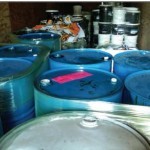July 23, 2013
DENVER – Executive Recycling, Inc. (a corporation) and Brandon Richter, age 38, of Highlands Ranch, Colorado, the owner and chief executive officer of Executive Recycling, were sentenced today by U.S. District Court Judge William J. Martinez for their roles in a fraudulent scheme related to the disposal and exportation of electronic waste to foreign countries, announced United States Attorney John Walsh, U.S. Immigration and Customs Enforcement’s (ICE) Homeland Security Investigations (HSI) Special Agent in Charge Kumar Kibble and EPA Criminal Investigation Division Special Agent in Charge Jeffrey Martinez. Executive Recycling, the corporation, was sentenced to pay a $4,500,000 fine and serve 3 years on probation. Richter was ordered to serve 30 months in federal prison, followed by 3 years on supervised release. Judge Martinez also ordered Richter to pay a $7,500 fine and $70,144 in restitution joint and several with the victims of the crime. Richter was ordered to report to a Bureau of Prisons facility within 15 days of designation. Judge Martinez also ordered $142,241.10 in asset forfeiture.
The defendants were convicted in December 2012 of multiple counts of mail and wire fraud and environmental crimes related to the illegal disposal of electronic waste, smuggling, and obstruction of justice, following an 11-day trial.
Last week former vice president of operations, Tor Olson, age 38, of Parker, Colorado, was sentenced to serve 14 months in prison, pay a $5,000 fine, and pay over $15,000 in restitution. Olson remains free on bond pending appeal.
Executive Recycling, Inc., as a corporation, Brandon Richter and Tor Olson were indicted by a federal grand jury in Denver on September 15, 2011. The jury trial before Judge Martinez began on December 3, 2012. The jury reached their verdict on December 21, 2012. Olson was sentenced on July 17, 2013.
According to the indictment, as well as the facts presented at trial, Executive Recycling was an electronic waste recycling business located in Englewood, Colorado with affiliated locations in Utah and Nebraska. The company collected electronic waste from private households, businesses, and government entities. Executive Recycling was registered with the Colorado Department of Public Health and Environment as a “Large Quantity Handler of Universal Waste.” Richter, as owner and CEO, was responsible for supervising all aspects of the company. Olson, the vice president of operations, was responsible for running day-to-day operations.

A significant portion of electronic waste collected by the defendants were Cathode Ray Tubes (CRTs). CRTs are the glass video display component of an electronic device, usually a computer or television monitor, and are known to contain lead. The defendants engaged in the practice of exporting electronic waste, including CRTs, from the United States to foreign countries, including the People’s Republic of China. The defendants regularly negotiated the sale of electronic waste to brokers who represented foreign buyers or who sold the electronic waste overseas. The foreign buyers often paid the defendants directly. To transport the electronic waste, the defendants used shipping cargo containers which were loaded at the company’s facility. The containers were then transported by rail to domestic ports for export overseas.
Executive Recycling appeared as the exporter of record in over 300 exports from the United States between 2005 and 2008. Approximately 160 of these exported cargo containers contained a total of more than 100,000 CRTs.
Between February 2005 and continuing through January 2009, the defendants knowingly devised and intended to devise a scheme to defraud various business and government entities who wanted to dispose of their electronic waste, and to obtain these business and government entities’ money by means of materially false and fraudulent pretenses. The defendants represented themselves on a website to have “extensive knowledge of current EPA requirements.” The defendants falsely advertised to customers that they would dispose of electronic waste in compliance with all local, state and federal laws and regulations. It was part of the scheme that the defendants falsely represented that they would dispose of all electronic waste, whether hazardous or not, in an environmentally friendly manner. Specifically, the defendants falsely represented that the defendant company recycled electronic waste “properly, right here in the U.S.” They also stated that they would not send the electronic waste overseas.
The defendants’ misrepresentation induced customers to enter into contracts or agreements with the defendants for electronic waste disposal. Each victim paid the defendants to recycle their electronic waste in accordance with the representations made by the defendants. Contrary to their representations, the defendants sold the electronic waste they received from customers to brokers for export overseas to the People’s Republic of China and other countries.
“The defendants in this case not only caused actual harm to the environment by shipping electronic waste overseas for dumping, they defrauded their customers by falsely claiming to be disposing of that waste in an environmentally safe way,” said U.S. Attorney John Walsh. “As cases like this one show, federal investigators and the U.S. Attorney’s Office can and will reach beyond our country’s borders to investigate crime and prosecute wrongdoers.”
“This prison sentence and fine awarded to this CEO demonstrate that there are no shortcuts to following U.S. export laws,” said Kumar Kibble, special agent in charge of HSI Denver. “This CEO also intentionally deceived the public for years by falsely advertising an environmentally friendly recycling business plan within the United States. Instead, he regularly exported tons of obsolete and discarded electronic equipment containing toxic materials to third-world countries, and took actions to illegally hide these practices from government officials.”
“The defendants claimed to safely recycle e-waste in the U.S., but regularly exported obsolete and discarded electronic equipment with toxic materials to third-world countries,” said Jeff Martinez, Special Agent in Charge of EPA’s criminal enforcement office in Colorado. “Pollution and greed respect no boundaries and EPA is committed to combating the illegal traffic of e-waste, which poses particularly significant environmental health risks in developing countries.”
This case was investigated by U.S. Immigration and Customs Enforcement’s (ICE) Homeland Security Investigations (HSI), the Environmental Protection Agency Criminal Investigation Division and the Colorado Attorney General’s Office, Special Prosecutions Unit.
The defendants were prosecuted by Assistant U.S. Attorneys Suneeta Hazra and Valeria Spencer and Special Assistant U.S. Attorney Lillian Alves.
Use caution when selecting a company to handle your universal waste, hazardous waste, or used oil. Their crimes could lead to your headaches.



